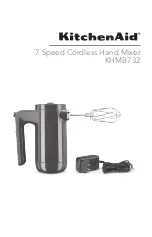
4
EN
• In order to provide increased safety against the risk of electric shock due to the use of
electrical appliances by laypersons, it is recommended to install the power supply circuit
for sockets with a rated current not exceeding 20 A RCD with a rated operating current
not exceeding 30 mA.
To ensure the safety and correctness of the electrical installation, consult a qualified
electrician.
• Only use a power cord with a plug (mains lead) supplied with the device and compatible
with a wall socket. Using another cable may result in fire or electric shock.
• Always connect an electrical appliance to an easily accessible mains socket. In the
event of an operating fault, the appliance must be switched off as soon as possible and
disconnected from mains supply.
• The power cord and mains plug must always be easily accessible for safe disconnection
of the electrical appliance from the power supply.
• Do not pull off the power cord by pulling the cable. Disconnect the power cord by pulling
the plug behind the power cord plug.
• If you use an extension cord, make sure that the total rated power of all devices
connected to the extension cord does not exceed the max. current load on the extension
cable.
• If you need to use an extension cord or power supply block, make sure that the
extension cord or power pack is plugged into a power socket, and not to another
extension cord or power supply. The extension power cord or power supply block
must be designed for grounded electrical plugs and connected to a properly grounded
electrical socket.
• The power plug of the appliance must be compatible with the mains socket. Never
use any adapters or modify the socket in any other way. Do not use inappropriate or
damaged drawers!
• To avoid electrical shock, plug the power cables into properly grounded electrical
sockets. If the device is equipped with a 3-pole plug, do not use adapters that do not
have a grounding element or remove the grounding element from the plug or adapter.
• Do not bend, crush or otherwise expose the power cord of the appliance to mechanical
stress or external heat sources. Damage to the power cord may result in electric shock.
• When the power cord is damaged, disconnect the appliance from the mains and do not
use it again.
• If the power cord is damaged, it must be replaced by the manufacturer, its service
department or a similarly qualified person to avoid the risk of electric shock.
• Regularly check and maintain the electrical appliance as well as the power cord and
power socket. Disconnect the power plug regularly and clean it if necessary. Pollution by
dust or other substances may cause disruption of the insulating state and consequently
fire.
• Do not expose the appliance to water or moisture. The ingress of water into the
appliance increases the risk of electric shock.
If the power cord is wet or the water has penetrated the water, disconnect it immediately
from the mains. If the appliance is plugged into a mains socket and if possible, turn off
the power circuit before attempting
unplug the power. If you are pulling wet wires from a live power source, be very careful.
• If the electrical equipment is installed (connecting) the protective covers are dismantled,
the electrical parts must not be accessible to the user when the installation is finished.




































